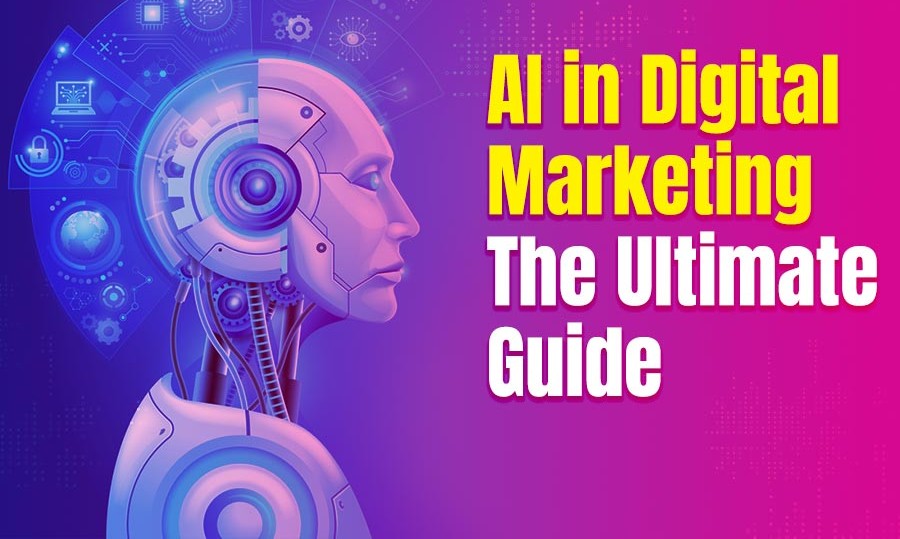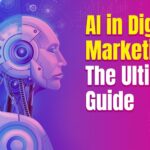AI (Artificial Intelligence) in digital marketing refers to using machine learning, data analytics, and automation tools to improve marketing efforts. Whether it’s predicting customer behavior or auto-generating content, AI in digital marketing helps brands streamline processes, reduce costs, and drive conversions.
From predictive analytics to automated customer service, AI in digital marketing is driving better results, improving efficiency, and reshaping strategies across the board.
This guide dives deep into how AI is revolutionizing the digital marketing landscape and how you can leverage its power to stay ahead of the competition.
1. What Is AI in Digital Marketing?
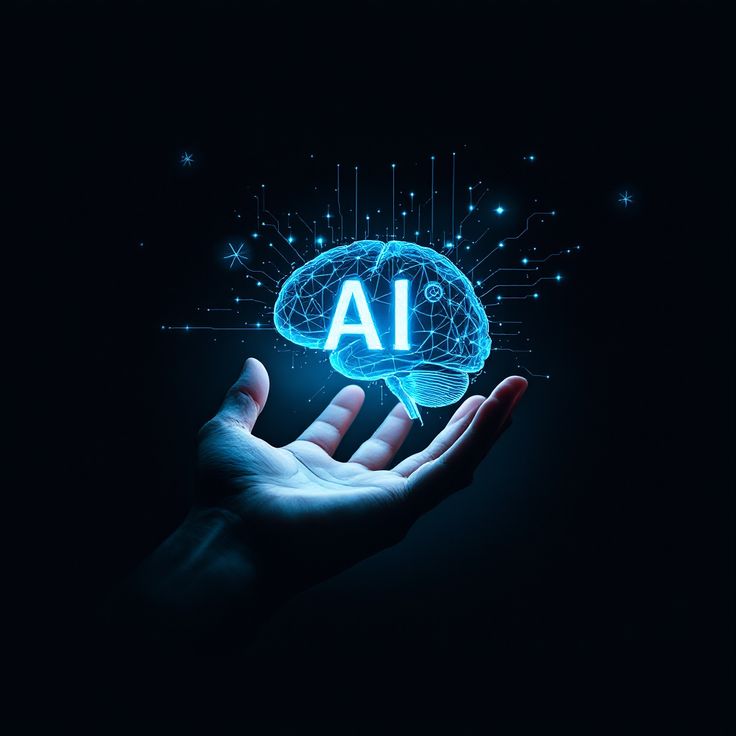
AI in digital marketing refers to the use of machine learning, algorithms, and data analysis tools to automate tasks, understand consumer behavior, and deliver personalized experiences. Marketers now use AI to segment audiences, recommend products, optimize ad spend, and even generate content.
Artificial Intelligence (AI) is revolutionizing how brands connect with their audiences. When we talk about AI in digital marketing, we’re referring to the use of intelligent tools and technologies that can analyze data, automate tasks, and even make decisions based on patterns and predictions.
In simpler terms, AI in digital marketing means using machines to do things like:
-
Personalize content for individual users
-
Predict customer behavior
-
Optimize ad campaigns automatically
-
Chat with customers using bots
-
Analyze huge amounts of data in seconds
These capabilities help marketers improve efficiency, save time, and create better user experiences. For example, platforms like Google Ads now use AI to automate bidding and targeting, while tools like ChatGPT and Jasper help brands create engaging content faster than ever.
Whether you’re running an email campaign, launching social media ads, or optimizing your website for search, AI in digital marketing can enhance every step of the process.
2. Key Applications of AI in Digital Marketing
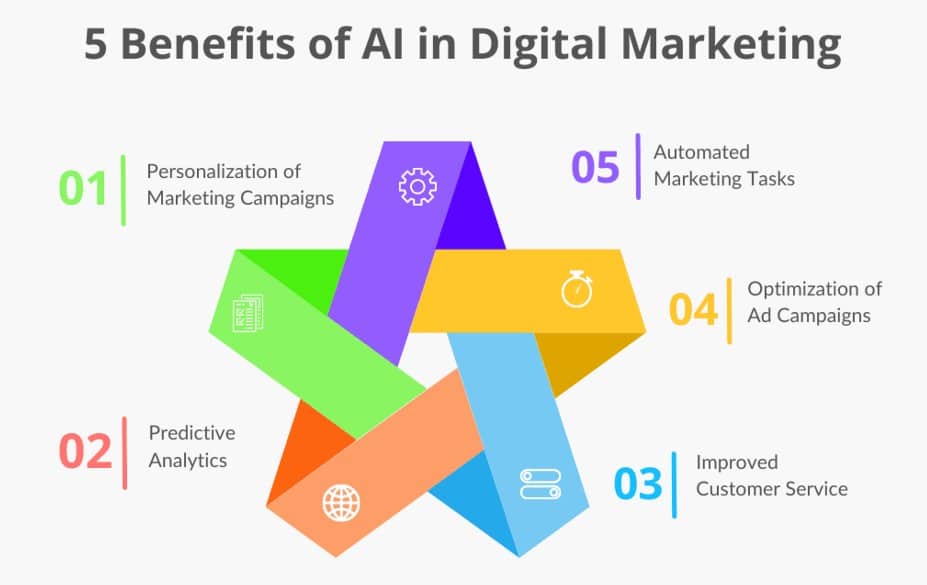
a. Content Creation and Personalization
AI tools like ChatGPT, Jasper, and Writesonic can generate blog posts, ad copies, and social media content in seconds. Personalized emails and landing pages are also created using AI algorithms based on user data.
One of the most impactful uses of AI in digital marketing is in content creation and personalization. AI-powered tools are now capable of generating high-quality content in seconds, whether it’s blog posts, social media captions, email subject lines, or ad copy. Tools like ChatGPT, Jasper, and Copy.ai help marketers speed up their workflow while maintaining creativity and tone.
But AI doesn’t just help create content — it makes that content smarter.
Through data analysis and behavioral tracking, AI can personalize content based on user preferences, browsing history, and interaction patterns. For example:
-
E-commerce sites use AI to display personalized product recommendations.
-
Email marketing tools send tailored messages at the right time for each user.
-
Social media ads can dynamically change text or visuals depending on who’s viewing them.
This level of personalization enhances user experience, improves engagement, and significantly increases conversion rates. By integrating AI in digital marketing, brands can deliver the right message to the right audience at the right time — automatically.
b. Chatbots and Customer Support
AI-powered chatbots provide 24/7 customer service, resolve queries instantly, and collect user data for future campaigns. Tools like Drift and Intercom enhance customer interaction and boost engagement.
One of the most impactful uses of AI in digital marketing is the integration of chatbots for enhanced customer support. These intelligent bots provide real-time responses, automate repetitive queries, and are available 24/7 — creating a seamless customer service experience.
Modern chatbots can:
-
Answer frequently asked questions in real-time
-
Assist users in navigating websites or finding products
-
Process orders and provide delivery updates
-
Escalate complex issues to human agents when needed
What makes them especially powerful is their ability to learn from interactions. Using natural language processing (NLP) and machine learning, chatbots can continuously improve their responses, becoming smarter and more helpful over time.
Businesses using AI chatbots not only reduce customer service costs but also enhance user experience through instant, personalized support. Whether it’s on websites, Facebook Messenger, or WhatsApp, integrating AI in digital marketing through chatbots boosts efficiency, satisfaction, and conversion rates.
c. Predictive Analytics
AI analyzes massive amounts of data to predict consumer behavior, forecast sales trends, and optimize campaign timing — enabling smarter marketing decisions.
Predictive analytics is one of the most powerful applications of AI in digital marketing, allowing brands to anticipate customer behavior before it happens. By analyzing historical data, user activity, and market trends, AI systems can forecast outcomes such as:
-
Which users are most likely to convert
-
When a customer might churn
-
What products a user is likely to purchase next
-
Which marketing channels will deliver the best ROI
Key Aspects of Predictive Analytics:
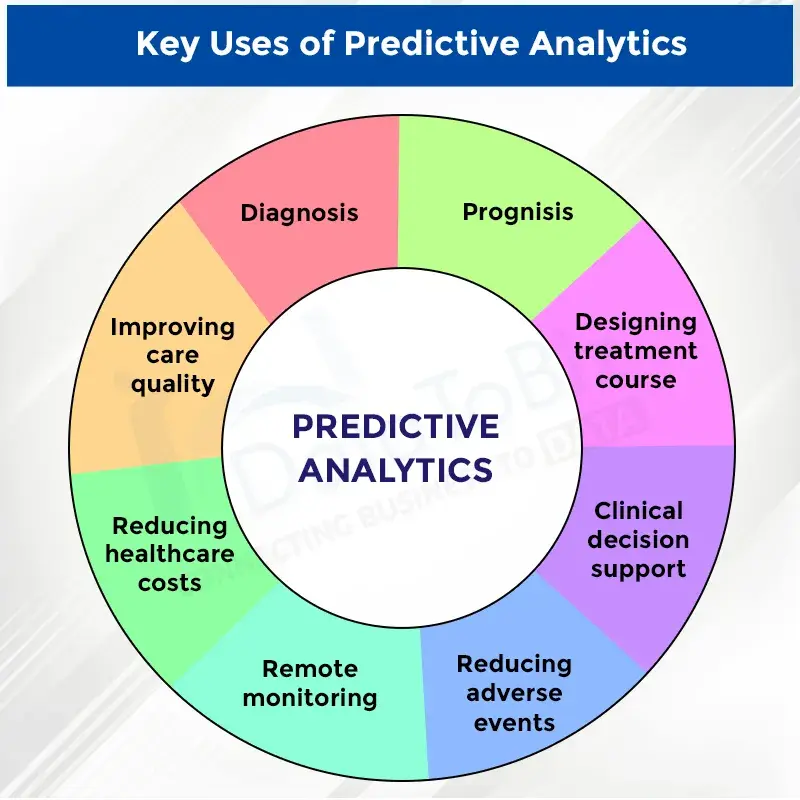
-
Conversion Prediction: AI models can determine which leads are most likely to convert, enabling marketers to focus resources where they’ll have the greatest impact.
-
Churn Analysis: By recognizing patterns that lead to customer drop-off, businesses can proactively implement retention strategies before customers leave.
-
Product Recommendations: E-commerce brands can offer personalized suggestions based on browsing and purchase histories, increasing upsell and cross-sell rates.
-
Optimized Campaign Timing: Predictive tools can identify the best times to send emails, push notifications, and launch ads for maximum engagement.
Why It Matters in Marketing
With ai in digital marketing, predictive analytics transforms data into foresight. Instead of running reactive campaigns, marketers can anticipate customer needs, optimize budgeting decisions, and tailor messaging for improved results. This leads to smarter campaign planning, higher ROI, and better customer experiences.
Ultimately, ai in digital marketing through predictive analytics transforms guesswork into strategy, helping marketers make proactive decisions, improve targeting accuracy, and drive better results.
d. Programmatic Advertising
With AI, ads are bought and placed automatically based on user interests, location, and behavior.
Programmatic advertising is a major innovation fueled by AI in digital marketing, transforming how brands buy and place ads online. Instead of relying on manual processes, AI automates the buying of digital ad space in real-time, ensuring the right message reaches the right audience at the right time.
What Is Programmatic Advertising?
Programmatic advertising uses AI algorithms to buy and display ads across platforms like websites, social media, and mobile apps. These systems analyze user data — including behavior, interests, and demographics — to deliver highly targeted ads with optimal timing and placement.
How AI Improves Programmatic Advertising
-
Real-Time Bidding (RTB): AI instantly evaluates the value of an impression and bids on ad space in milliseconds.
-
Audience Targeting: Machine learning models help identify and reach highly specific audience segments, increasing ad relevance and performance.
-
Cost Efficiency: AI adjusts spending based on campaign results, helping marketers make the most of their digital marketing budget.
-
Ad Optimization: AI continuously tests variations of creatives and placements, learning what performs best and making adjustments on the fly.
Why It Matters
With AI in digital marketing, programmatic advertising has become smarter, faster, and more efficient. Brands no longer waste resources on broad, untargeted campaigns. Instead, they can deliver personalized ads that resonate — driving higher engagement and better ROI.
e. Visual Recognition
AI in digital marketing also includes visual recognition to identify user-generated content, monitor brand presence online, and curate targeted ads based on image analysis.
Visual recognition is one of the most exciting applications of AI in digital marketing, allowing brands to understand and respond to visual content with incredible precision. From analyzing user-generated photos to enabling advanced product tagging, AI-driven visual tools are reshaping how marketers engage audiences.
What Is Visual Recognition?
Visual recognition involves AI systems that can “see” and interpret images or videos just like a human would — but faster and at scale. It can detect objects, logos, facial expressions, text, and even emotions within visual content. This data can then be used to inform marketing strategies and personalize user experiences.
How AI Visual Recognition Is Used in Marketing
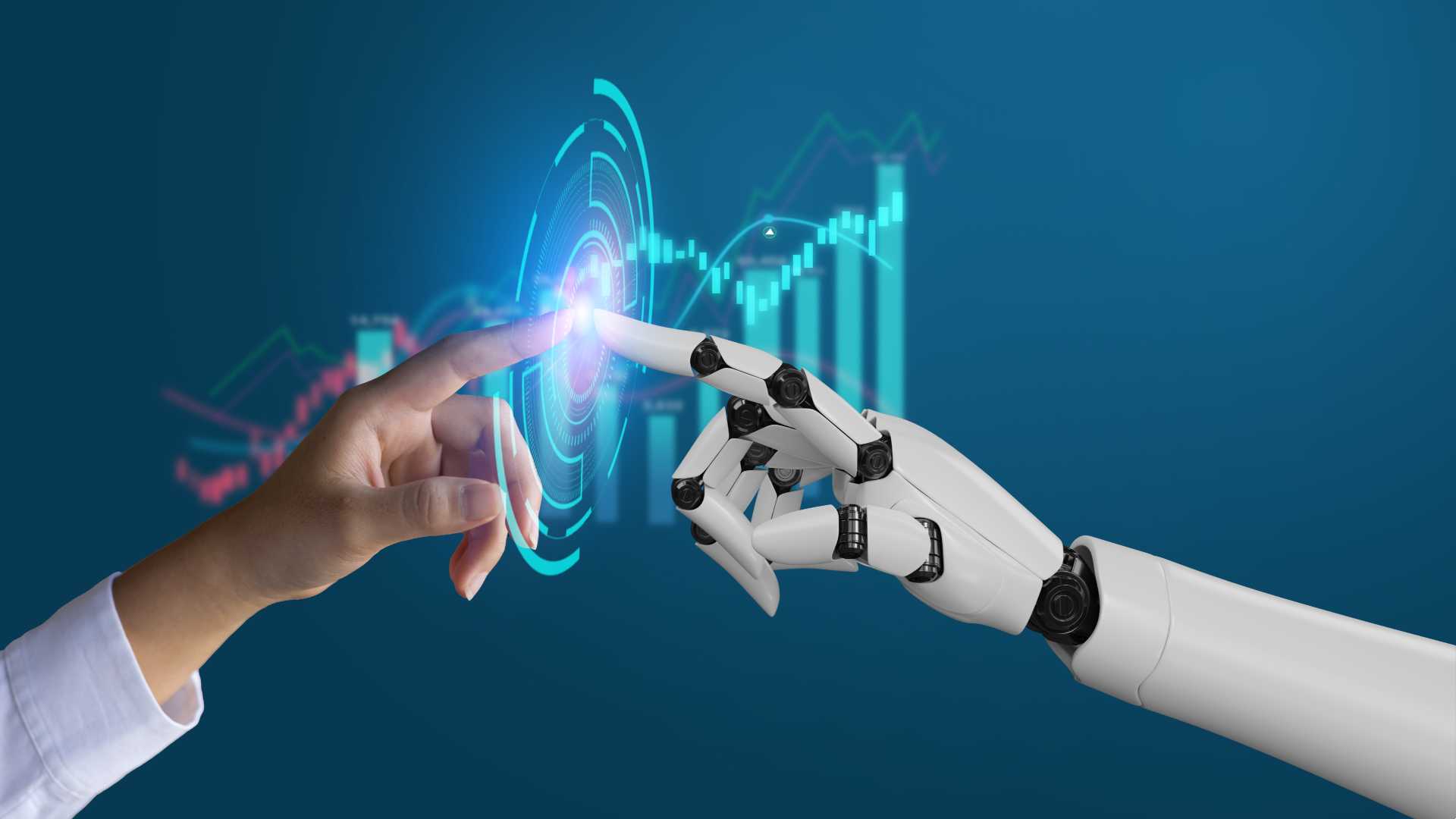
-
User-Generated Content Analysis: AI scans social media posts to find images that feature a brand’s product, helping marketers understand real-world usage and sentiment.
-
Visual Search: Platforms like Pinterest and Google Lens allow users to search using images, making it easier for brands to capture high-intent shoppers.
-
Smart Tagging and Categorization: E-commerce platforms use AI to automatically tag products in photos, speeding up content management and improving searchability.
-
Ad Placement and Monitoring: Visual recognition tools can track where a brand’s logo appears across digital spaces, ensuring better ad visibility and brand safety.
Visual Search
Platforms like Pinterest and Google Lens use visual recognition to allow users to search using images instead of text. Brands can optimize their product visuals so that customers can find similar items just by uploading a photo.
- Social Listening with Image Analysis
Marketers can now track how often their brand logos or products appear in user-generated content — even when they aren’t tagged — helping them measure brand visibility across platforms.
- Automated Product Tagging
E-commerce brands use visual recognition to tag products automatically in photos and videos, making it easier to build shoppable posts or categorized galleries.
- Personalized Ad Targeting
AI can analyze a user’s visual preferences — like the types of clothes or environments they engage with — and deliver highly tailored visual ads that match their taste.
Why It Matters
By integrating AI in digital marketing, visual recognition provides deep insights into how consumers interact with brands visually — a growing part of modern communication. It enhances personalization, strengthens visual storytelling, and helps marketers stay ahead in an image-driven digital world.
3. Benefits of AI in Digital Marketing
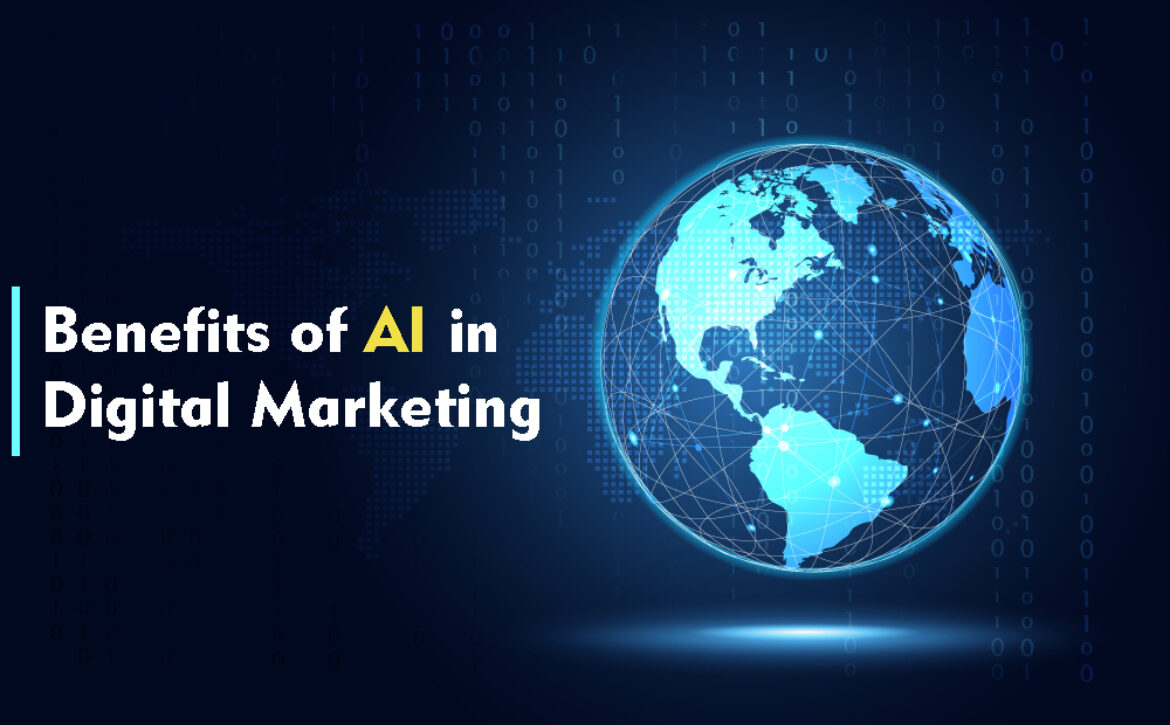
-
Increased Efficiency: Automate repetitive tasks like reporting, content scheduling, and data analysis.
-
Improved Targeting: AI helps identify the right audience with high precision.
-
Cost Reduction: Smarter ad placement reduces wasted spend.
-
Better Personalization: Tailor content and offers based on individual behavior.
-
Real-Time Insights: Make faster decisions with dynamic analytics.
The integration of AI in digital marketing has completely transformed how brands connect with their audiences. From automation to personalization, AI brings a wide range of benefits that improve efficiency, accuracy, and engagement.
1. Personalized Customer Experiences
AI enables hyper-personalization by analyzing user behavior, preferences, and interactions. Brands can deliver tailored content, product recommendations, and messaging at the right time, significantly improving customer satisfaction and conversions.
2. Faster Decision-Making
With real-time data processing and predictive analytics, AI helps marketers make quicker, data-backed decisions. Whether adjusting a campaign or optimizing content, AI reduces guesswork and accelerates strategic moves.
3. Enhanced Efficiency and Automation
AI tools can automate repetitive tasks such as email marketing, social media scheduling, and ad placement. This allows marketing teams to focus on creative strategy while AI handles execution and monitoring.
4. Advanced Audience Targeting
Using machine learning, AI can segment audiences based on detailed data points, ensuring campaigns are highly targeted.
5. Improved ROI
Thanks to better targeting, automation, and real-time optimizations, campaigns driven by AI in digital marketing often yield a higher return on investment. AI helps allocate budget to the most effective channels and content types.
6. 24/7 Customer Support
AI-powered chatbots ensure that customer queries are addressed instantly, at any hour. This boosts customer satisfaction and engagement without increasing support costs.
4. AI Tools Every Digital Marketer Should Know
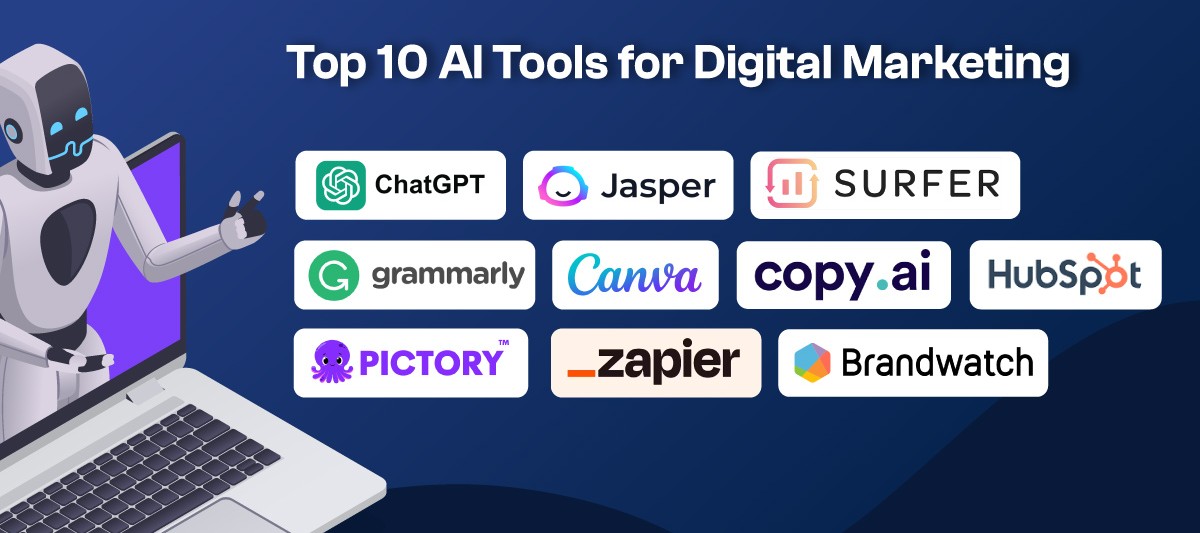
-
ChatGPT – AI content generation
-
Canva AI – Visual content and design
-
SEMrush & Ahrefs – AI-driven SEO tools
-
HubSpot – AI for CRM and email automation
-
Google Analytics 4 – Smart data insights
As the role of AI in digital marketing continues to expand, marketers are turning to intelligent tools to boost performance, save time, and improve targeting. Here are some of the most essential AI-powered tools every digital marketer should have in their toolkit:
1. ChatGPT (OpenAI)
For content generation, idea brainstorming, and even automating replies, ChatGPT is one of the most versatile AI tools. Marketers use it to craft email copy, social media posts, ad headlines, and more.
2. Jasper AI
A powerful writing assistant tailored for marketers, Jasper AI helps create high-converting landing pages, blog posts, and product descriptions. It’s optimized for SEO and brand tone.
3. Canva (Magic Write + AI Design Tools)
Canva now includes AI-powered features like Magic Write and background removal. It simplifies creative workflows for teams who need professional-level visuals quickly.
4. Surfer SEO
Combining ai in digital marketing with SEO best practices, Surfer analyzes content and suggests real-time improvements. It’s ideal for marketers focused on improving organic reach.
5. Lumen5
For video marketers, Lumen5 uses AI to transform blog posts or text into engaging social media videos — complete with stock footage, animation, and auto-captions.
6. Pictory
This tool converts long-form video content into short, shareable clips using AI. It’s a favorite for repurposing webinars or podcasts into bite-sized social media content.
7. HubSpot (AI CRM & Automation)
HubSpot’s built-in AI features help with lead scoring, customer segmentation, and workflow automation. It’s especially useful for scaling digital campaigns.
5. Challenges and Ethical Considerations
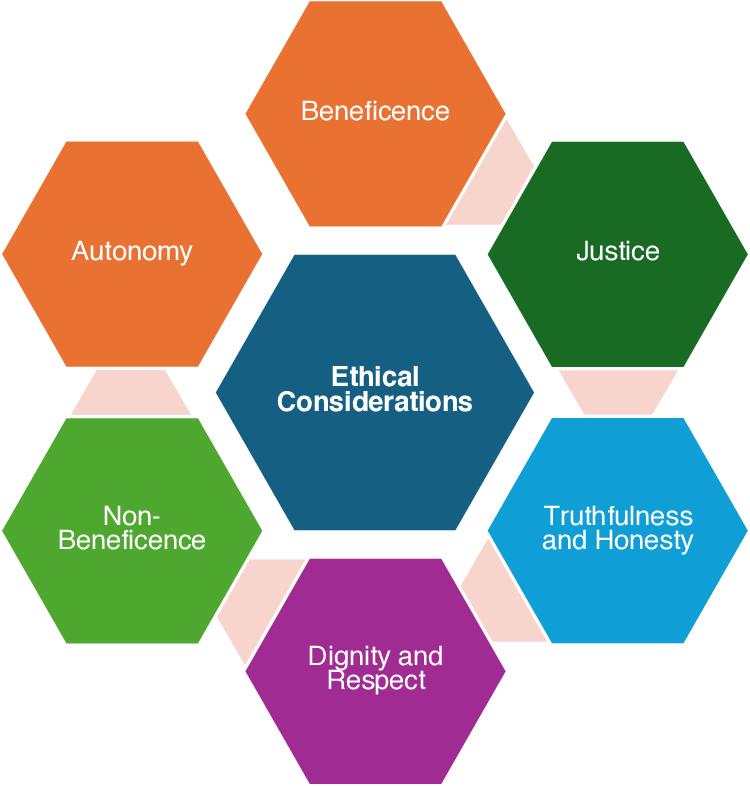
While AI brings tremendous benefits, it also comes with concerns like:
-
Data Privacy: Misuse of user data can damage trust.
-
Bias in Algorithms: AI systems may unintentionally favor or exclude certain groups.
-
Job Automation: Repetitive roles in marketing may be reduced or eliminated.
Digital marketers must implement AI ethically, ensuring transparency and user trust.
1. Data Privacy and Security
AI in digital marketing heavily relies on user data. From browsing behavior to purchase history, AI tools analyze vast amounts of personal information to deliver targeted content. However, this raises concerns about data collection, storage, and usage. Marketers must ensure compliance with global privacy regulations such as GDPR, and be transparent about how consumer data is used.
2. Algorithmic Bias
AI models learn from data, but if the data is biased, so are the outcomes. Biased algorithms can lead to unfair targeting, exclusion of certain groups, or even discriminatory ad delivery. It’s crucial for brands to routinely audit AI systems and ensure their campaigns are inclusive and equitable.
3. Over-Automation Risks
While automation boosts efficiency, overusing it may reduce authenticity in brand messaging. Customers still value human touch, especially in customer service, and marketers must strike a balance between automation and personalization.
Loss of Personal Touch
Relying too heavily on automated messages and AI-generated content can make brand communications feel impersonal and robotic, potentially alienating your audience.
Reduced Creativity and Innovation
Excessive automation may limit human creativity and unique ideas, leading to repetitive or generic campaigns that fail to engage.
Technical Glitches and Errors
Automated systems aren’t foolproof. Errors in AI algorithms or misconfigured automation can lead to miscommunication, wrong targeting, or brand damage.
Balancing Automation with Human Oversight
To mitigate these risks, digital marketers should combine AI efficiency with human judgment, ensuring campaigns remain authentic, creative, and error-free.
4. Job Displacement Concerns
As AI in digital marketing becomes more powerful, there are growing concerns about the displacement of human roles in content creation, analytics, and strategy. Businesses should focus on upskilling employees to work alongside AI, not be replaced by it.
-
Upskill Continuously: Marketers should learn to work alongside AI tools, enhancing their capabilities rather than competing with automation.
-
Focus on Human Creativity: AI can assist but not replace the emotional intelligence and creativity that human marketers bring.
-
Embrace New Roles: Emerging positions like AI marketing strategists and data ethicists are becoming vital.
5. Misinformation and Deepfakes
AI-generated content, if misused, can easily spread misinformation. Deepfakes and fabricated reviews pose serious reputational risks. Brands must implement strict quality controls and verification processes.
Impact on Digital Marketing
Misinformation can quickly go viral, confusing audiences and undermining authentic marketing efforts. Deepfakes can be used maliciously to impersonate brands, executives, or influencers, potentially harming reputation and misleading customers.
How Marketers Can Respond
-
Verify Content Authenticity: Use AI-powered tools to detect and flag manipulated media.
-
Maintain Transparency: Clearly communicate brand messages and verify official sources.
-
Educate Audiences: Raise awareness about misinformation and promote critical consumption of digital content.
Why a Digital Marketing Cover Letter Is Crucial
Your resume tells employers what you’ve done. But your Digital Marketing Cover Letter tells them why you did it and how it made a difference.


